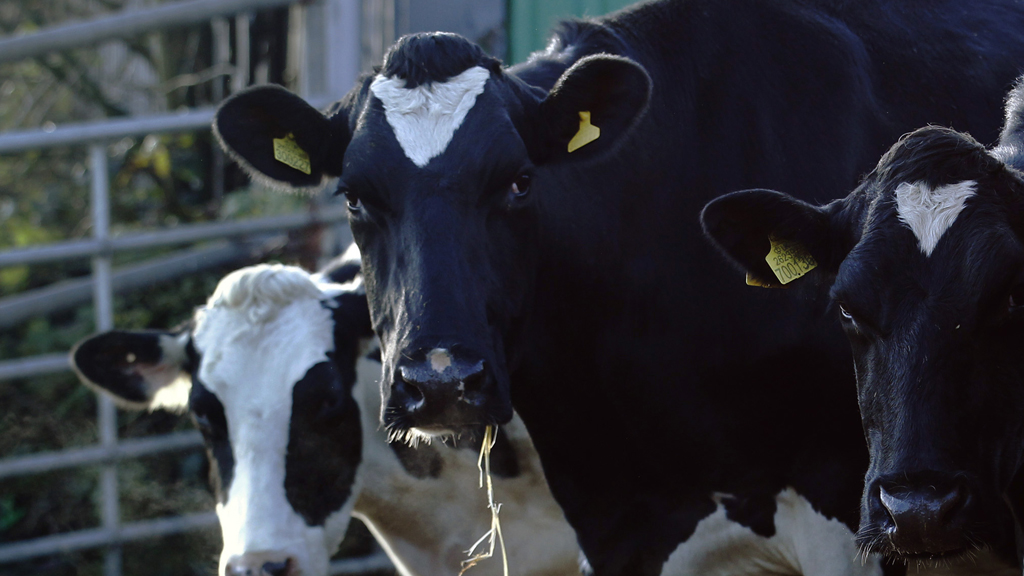Selfridges in court over raw milk sales
Supporters claim it is tastier and more nutritious – but the Food Standards Agency has taken Selfridges and a dairy farmer to court for selling raw milk at the London store.

You can buy it direct from the farm or from a registered farmers market. But try buying raw milk from another shop, and the law is far less clear. Now the London department store Selfridges is in court, accused of risking public health by selling raw milk from a vending machine in its food hall.
During the three month trial in 2011, customers could fill up bottles with raw milk supplied by farmer Steve Hook, who produces it at his farm in East Sussex. And that, argues the Food Standard Agency, was in breach of food hygiene regulations.
Raw, or unpasterurised milk, has a small, but intensely loyal following. Supporters claim it contains more vitamins and important enzymes than treated milk, and beneficial bacteria which can help to tackle allergies.
It’s currently banned altogether in Scotland, and in the rest of the UK producers are subject to stringent health and hygiene checks. Bottles must carry a warning that the milk could contain bacteria like salmonella and Ecoli, which could cause illness.
If you get people to just try it, they become hooked. Dairy farmer Dave Paul
There are only around 200 farms across England and Wales which produce it, including the Hurdlebrook Dairy near Yeovil in Somerset, where Dave Paul has been selling raw milk since the late nineteen eighties.
He told Channel 4 News he now sells around 200 litres a week, some direct from his farm, the rest through certified London farmers’ markets. “Raw milk is a far superior product”, he said. “It’s got a far better taste, it’s in its natural state, and hasn’t been heat treated, which changes the composition completely.”
“If you get people to just try it, they become hooked”, he said, claiming that as long as it was properly labeled so customers knew what they were buying, it should be about freedom of choice.
Mr Paul said he had never heard of anyone getting eColi from raw milk, although it was theoretically possible: “the hygiene and standards we have to adhere to are so stringent these days it would be hard to imagine.”
Stringent standards
Steve Hook, the farmer who supplied raw milk to the Selfridges food hall trial, has also insisted that dairies have to pay “fantastic attention to hygiene” to meet the FSA standards, and says it is much safer than in pre-pasteurisation days, with herds certified free from TB and other diseases.
In fact, he is so enthusiastic about his product, there’s even a film, Moo Man, which premiered at Sundance and is on the bill at the Berlin Film Festival later in February. After turning to organic milk in 2000, he decided to bypass the big supermarket and milk retailers and sell dierct to the public.
The decision breathed new life into his business, but some traditional dairy firms are worried that even the merest hint of a health scare could hit sales across the whole sector. The Campaign for Real Milk UK says most sellers are perfectly happy with the current rules, and don’t want to risk a heavier crackdown.
They say there have been no outbreaks of related disease for 20 years, which shows the current regulations work. “The country is not ready yet for secondary sales and we must not jeopardise the future of raw milk consumption.”
Consumer choice?
But others think consumers should have the chance to make an informed choice. London ice cream shop Gelupo says the law should be clarified, adding: “Last year, we bought a few pints and made the most amazing tasting fior di latte gelato, and some great lattes. It would currently be illegal for us to sell anything made with raw milk, but we’d love to have the opportunity to do so safely.”
According to Dave Paul, it is unlikely that the FSA will try to ban raw milk across the whole country: efforts to do that in the early 90s, he said, failed in the face of a huge outcry. Instead, he predicted that there would probably be even more stringent regulations.
In an ideal world, he would love to be able to sell through more outlets. “It would be a fantastic way of spreading word about the product and the taste, and getting more people to try it.”
But with all the current hysteria about food safety and public health, that is an outcome which seems highly unlikely.
-
Latest news
-
Fans react to football clubs increasing season ticket prices4m

-
‘We’re still a long way from justice’, says infected blood scandal victim5m

-
Infected blood scandal: Victims set to receive billions of government compensation7m

-
Iran’s president and foreign minister missing after helicopter crash3m

-
Yungblud launches his own affordable music festival5m

-




